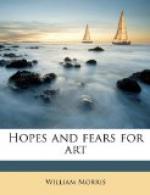That to my mind is the meaning of what we call National Education, which we have begun, and which is doubtless already bearing its fruits, and will bear greater, when all people are educated, not according to the money which they or their parents possess, but according to the capacity of their minds.
What effect that will have upon the future of the arts, I cannot say, but one would surely think a very great effect; for it will enable people to see clearly many things which are now as completely hidden from them as if they were blind in body and idiotic in mind: and this, I say, will act not only upon those who most directly feel the evils of ignorance, but also upon those who feel them indirectly,—upon us, the educated: the great wave of rising intelligence, rife with so many natural desires and aspirations, will carry all classes along with it, and force us all to see that many things which we have been used to look upon as necessary and eternal evils are merely the accidental and temporary growths of past stupidity, and can be escaped from by due effort, and the exercise of courage, goodwill, and forethought.
And among those evils, I do, and must always, believe will fall that one which last year I told you that I accounted the greatest of all evils, the heaviest of all slaveries; that evil of the greater part of the population being engaged for by far the most part of their lives in work, which at the best cannot interest them, or develop their best faculties, and at the worst (and that is the commonest, too) is mere unmitigated slavish toil, only to be wrung out of them by the sternest compulsion, a toil which they shirk all they can— small blame to them. And this toil degrades them into less than men: and they will some day come to know it, and cry out to be made men again, and art only can do it, and redeem them from this slavery; and I say once more that this is her highest and most glorious end and aim; and it is in her struggle to attain to it that she will most surely purify herself, and quicken her own aspirations towards perfection.
But we—in the meantime we must not sit waiting for obvious signs of these later and glorious days to show themselves on earth, and in the heavens, but rather turn to the commonplace, and maybe often dull work of fitting ourselves in detail to take part in them if we should live to see one of them; or in doing our best to make the path smooth for their coming, if we are to die before they are here.
What, therefore, can we do, to guard traditions of time past that we may not one day have to begin anew from the beginning with none to teach us? What are we to do, that we may take heed to, and spread the decencies of life, so that at the least we may have a field where it will be possible for art to grow when men begin to long for it: what finally can we do, each of us, to cherish some germ of art, so that it may meet with others, and spread and grow little by little into the thing that we need?




